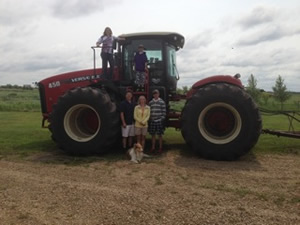A farmer’s work ethic gets tested between drought and floods.
Drought in 2002 and cattle markets closing in 2003 took everything Ward Hoculak had on his Lamont, Alberta farm. It was “start over” for the fourth generation, 43-year-old farmer. The world closed its borders to Canadian beef because of bovine spongiform encephalopathy, also known as mad cow disease, devastating all cattle farmers, Ward said. He was tired of spraying chemicals and his brother Sid and him complained about low commodity prices. He said it made him sick to work year round and never see a penny, with most of his money feeding chemical and fertilizer companies.

“If I was lucky I got a jackknife or a hat at the end of the year,” he said.
So he decided to make a change. He started transitioning his fields toward organic certification in 2007 with a nudge from his wife Jacquelin and two neighbors who said the Organic Crop Improvement Association was a great place to be certified. It was one of the only member-driven groups and it had a chapter in his area, the Alberta Organic Producers Association. Talking about farms and stories has been rejuvenating, he said. Now he knows where he can point his car or truck when he’s going for a drive this summer, toward other organic farmers.
“Basically they were there to be teaching you the ropes,” Ward said.
He said he was brainwashed to farm with chemicals and didn’t know how to be an organic farmer. He had to get used to plowdowns on his 2,000 acres and he almost had to be told what to seed; not barley on barley or wheat on wheat. He became certified in 2009 and adopted a crop rotation that includes wheat, barley, oats and fallow. He researched equipment for weed control and decided on a rotary hoe that he had to ship 2,000 miles — it’s uncommon in Canada. It worked fantastic on drier years, he said.
Ward’s challenges went to the opposite extreme a decade after the drought, with 2013 being called the worst year for floods in Alberta. He wasn’t able to harrow or rotary hoe and saw crops “get a little weedy.” Wild oats took over two crops, but it was still a good year because he sold some crops to a feedlot as silage, he said. His non-organic neighbors sprayed herbicides on their crops four or five times.
Spraying was part of the “ace in the hole” for Ward to certify organic. His father Edward, who farmed before synthetic chemicals dominated agriculture, was proud to see him quit using chemicals, Ward said. He hasn’t looked back. Organics made his farm profitable. He gets to keep his cattle money from his certified organic herd of 70 limousin cows and charolais bulls and he gets what he called a bonus on grain production. One measurement of success was he bought a new tractor — a 2014 Versatile 450, four-wheel drive — for the first time last year.
“Nature’s letting us grow our crop and nature’s rewarding us, too,” he said.
The biggest issue Ward saw with OCIA chapters across Canada was producers who grew organic grain for 10 to 20 years were retiring with few people replacing them. It’s a constant shortage, he said. Weather issues gobbling up Canadian wheat don’t help.
Ward was unsure if his own children would farm, but the place would be there for them, he said. They’re etching out niches in the farm that was established in 1909. His son Matthew, 15, started riding on a Case tractor when he was six months old and refused to ride a New Holland combine. They traded in the New Holland for a John Deere, to his relief, making John Deere the only brainwashing done to him, Ward said. Ward’s younger son, Thomas, 11, baled hay for the first time with his dad in 2013. Ward’s daughter Faith, 13, and Thomas love animals. Faith was the “gate girl” for Ward when they feed cattle. She was “apprentice chef” to Jacquelin, he said. Jacquelin had other responsibilities such as being Ward’s “taxi driver”, an avid gardener and troubleshooter.
“When I can’t fix it, she reads instructions only to prove me wrong!” he said. “We all help and work together. Without this it’s pointless.”
Ward reaches out to other farmers in his area and internationally now. He influenced a few people to join his OCIA chapter, as its president two years and with his the fourth year on the chapter board. And he was able to go to San Antonio, Texas, to meet other OCIA members at its international Annual General Membership Meeting. He wouldn’t have thought he’d go to such a meeting 10 years ago, he said. Sid was still complaining, but he’s too stubborn to change, Ward said. He said he’s thankful for his brother’s complaining because it led him to make a difference in how he feeds the world.
“I mush have listened too good because I changed and I still get to listen to the complaining,” he said, “but I don’t get to join in the conversation because I don’t have anything to complain about.”
He’s excited to wake up and work on a summer morning, he said.
“When you’re excited to go to work, you’re going to do a good job.”
The OCIA Family Spotlight is a series of stories about OCIA members, in celebration of the International Year of Family Farming.
CONTACT
Date Published: August 8th, 2014
Author/Title: Demetria Stephens, OCIA International Board Member
E-Mail: sandnuri@gmail.com
Address: OCIA, 1340 N. Cotner Blvd, Lincoln, NE, 68505
